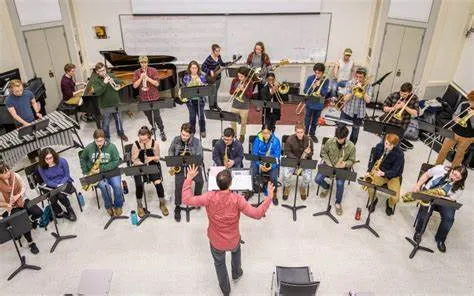University music programs provide an essential foundation for individuals seeking to cultivate their musical talents and pursue careers in various music-related fields. These programs blend rigorous training, artistic exploration, and theoretical knowledge, equipping students with the skills necessary to navigate the evolving landscape of music. In this article, we will delve into the essential components of university music programs, the diverse degree options available, and the enriching experiences that await students.

About University Music Programs
University music programs are tailored to nurture musical aptitude and broaden students’ understanding of the art form. These programs cover a spectrum of disciplines, including performance, music education, composition, music theory, and sound technology. Through a combination of hands-on experiences and academic coursework, students are encouraged to find their unique artistic voices while gaining a thorough comprehension of music as a scholarly discipline.
Types of Music Degrees
- Bachelor’s Degree
- Bachelor of Music (BM): Focuses on intensive training in performance, composition, or education, providing a robust foundation for aspiring musicians.
- Bachelor of Arts (BA) in Music: Offers a more general approach, integrating music studies within a broader liberal arts education, allowing students to explore various interests.
- Master’s Degree
- Master of Music (MM): An advanced degree emphasizing specialized study in areas such as performance or composition, often culminating in a recital or a thesis project.
- Master of Arts (MA) in Musicology: Concentrates on the scholarly aspects of music, including its history and cultural significance.
- Doctoral Programs
- Doctor of Musical Arts (DMA): Focuses on high-level performance or composition, typically requiring a final recital or a major project.
- Ph.D. in Musicology: Emphasizes research and critical analysis in music, preparing graduates for academic careers in higher education.
Core Components of University Music Programs
- Performance Training: Students receive individualized instruction and participate in various ensembles, refining their technical skills and artistic expression.
- Music Theory and Ear Training: These foundational courses develop analytical skills and enhance students’ abilities to understand and create music.
- Music History: Provides insight into the evolution of music across cultures and time periods, deepening students’ appreciation for diverse musical styles.
- Composition and Arranging: Students learn the art of creating original music, exploring different genres and compositional techniques.
- Music Technology: Familiarizes students with contemporary tools for recording, producing, and editing music, essential in today’s music industry.
Benefits of University Music Programs
- Skill Enhancement: Students gain both technical proficiency on their chosen instruments and strong analytical skills crucial for musical interpretation and creation.
- Networking and Collaboration: Music programs facilitate connections with industry professionals and fellow musicians, offering valuable opportunities for internships and collaborations.
- Creative Exploration: The academic environment encourages creativity, allowing students to experiment with their artistic ideas and collaborate on various projects.
- Career Readiness: Graduates are well-prepared for a range of careers, including performance, teaching, music therapy, and administrative roles within the music industry.
Student Experience and Campus Life
Music students often thrive in a dynamic and supportive campus environment. They engage in various extracurricular activities, including performances, workshops, and masterclasses, which enhance their educational journey. Collaboration is a central theme, as students work with peers from diverse musical backgrounds, fostering a sense of community. Additionally, universities often provide access to state-of-the-art facilities, such as performance halls and recording studios, further enriching the student experience.
Conclusion
University music programs play a crucial role in shaping the future of aspiring musicians and music professionals. By providing a comprehensive education that balances practical skills with theoretical knowledge, these programs prepare students to excel in their chosen careers. Whether pursuing performance, education, or composition, students emerge from these programs with a profound appreciation for music and the confidence to contribute meaningfully to the art form. For anyone passionate about music, a university program can be a transformative and fulfilling path toward realizing their dreams.